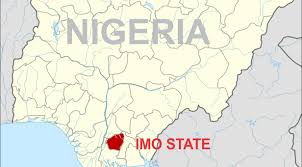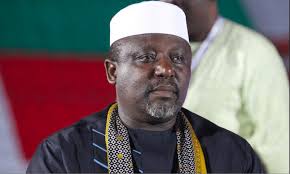
‘When an old woman falls down repeatedly under the weight of the bundle she bears on her head, it becomes imperative to bring down the load, unbundle it to check its content’, so goes an Igbo adage.
The current travails of EFCC and its suspended acting Chairman, Mr. Ibrahim Mustafa Magu, a Commissioner of Police, as well as the unfolding and associated drama surrounding it call to question the imperative of retaining EFCC the way it presently is constituted. Though Magu has been released from custody while the work of the presidential panel continues, the latest revelations by Magu detailing how certain assets confiscated and managed by EFCC, were managed, or disposed of, and which appear to, at least, constitute part of the major substance of the allegations against him, show process deficit in the anti corruption agency.
Ibrahim Magu has been accused of almost everything possible or conceivable, depending on the section of the media or the slant of the report you read or listen to. From living ‘high profile lifestyle’ and flying in private jets with suspects under investigation, to doing ‘magu magu’ (pardon the pun) with recovered loot, with allegations of insubordination and disobedience to the Honorable Minister of Justice (the constituted authority according to late Sen. Abiola Ajimobi). Certainly, before the whole drama comes to a conclusion, more ‘revelations’ and discoveries would certainly be made. Certainly this is not to make light of the allegations or the resolve of President Buhari’s administration to confront corruption.
However, this whole scenario of the arrest, detention and investigation seems like déjà vu.
There had been 3 previous EFCC administrations since the establishment of the Commission in 2003, before Magu’s. 1st was the administration of Mr. Nuhu Ribadu, a then serving senior police officer, who was its first Chairman, and served from 2003 to 2007. There was what I will call the Ibrahim Lamorde interregnum as the latter held sway very briefly in an acting capacity between January to May 2008.
Subsequently, Mrs. Farida Waziri, a retired senior Police officer was appointed by the Yar’Adua administration and she held sway between 2008 and 2011. Ibrahim Lamorde, a serving senior Police officer too was appointed by President Goodluck Jonathan in 2011 in an acting capacity which was made substantive in 2012 after the confirmation by Senate. He served till 2015 when he was removed by the present President Buhari administration, which appointed Mr. Magu in an acting capacity, which was the capacity in which Magu served till his suspension because the Senate refused to confirm his appointment.
Now, aside that all were either serving or retired officers of the Nigeria Police, two interesting factors in the administrations of these persons either as EFCC chairmen or acting chairmen, are that their tenures in office were all truncated unceremoniously, AND mostly with allegations of corruption and/or insubordination made against them.
Nuhu Ribadu was booted out shortly after the end of Obasanjo’s administration through the instrumentality of the then Inspector General of Police, Mr. Mike Okiro, who directed him to vacate his post at EFCC and proceed to the National Institute for Policy and Strategic Studies (NIPSS) ostensibly for a compulsory one year programme from 2008. It went downhill from thenceforth. Ribadu suffered the humiliation of being demoted from the rank of Assistant Inspector General (AIG) of Police to a Deputy Commissioner (DC) of Police. He was subsequently dismissed by the Police Service Commission (PSC). He later fled Nigeria on exile following reports of threat to life. It was not until a couple of years later that those actions were reversed and his rank was restored. Of course he had recourse to the court of law.
Mrs. Farida Waziri was unceremoniously dismissed by President Jonathan after about 3 plus years in office. While there were allegations of corruption against her, officially, the then president stated that her removal was ‘in the national interest…and to protect Nigeria’s global standing’. She was alleged to have been under investigation by the Independent Corrupt Practices Commission (ICPC) but she was never prosecuted after her dismissal from office.
Ibrahim Lamorde, was confirmed as the substantive Chairman of EFCC in February 2012. He was the Director of Operations. He was sacked by President Buhari in 2015 before the expiration of his 4 year tenure of office. He had allegations of corruption against him and was investigated by the Senate Committee on Ethics, Privileges and Public Petitions on alleged diversion of N1tr recoveries made by the Commission. He denied the allegations but failed to appear before the Senate Committee when summoned, which caused the Senate to order his arrest by the IGP.
He immediately left Nigeria and travelled abroad ostensibly to seek medical assistance according to his counsel then, Festus Keyamo, Esq (SAN). Many however saw the unceremonious flight as his effort to avoid arrest. He is fully back now however, and is presently an Assistant Inspector General (AIG) of Police in charge of Police Directorate of force Intelligence.
Presently, and as alluded to above, Ibrahim Magu is going through the same rite of removal of previous EFCC bosses, rife with allegations of corruption, insubordination, and other salacious gossip. Of course he is on suspension while another person, Mr. Mohammed Umar, the current Director of Operations, holds fort albeit in a temporary capacity.
Section 1 of the EFCC (Establishment) Act of 2003 establishes the Commission as body corporate with perpetual succession, while sections 2 and 3 deal with the composition of the EFCC and tenure of offices of members. The Chairman of the Commission is the chief executive and accounting officer. Section 2 (ii) and (iii) provide that the chairman shall be ‘a serving or retired member of any government security or law enforcement agency not below the rank of Assistant Commissioner of Police or equivalent, and possess not less than 15 years cognate experience. Section 3 provides that the Chairman and members may enjoy a maximum of 2 terms of 4 years each.
Of the treble of Ribadu, Waziri, and Lamorde all of whom were appointed as substantive chairmen of the commission following their confirmation by the Senate, none served out the full tenure provided in the EFCC Act. Ribadu had his tenure extended by President Obasanjo, but was removed shortly after Obasanjo left power. Farida Waziri was appointed in 2008 and removed in 2011 without fully serving a tenure. Ditto for Lamorde.
‘‘We have all been witnesses to seizures of property in choice locations, exotic vehicles, and funds made by EFCC as part of their investigation, for which interim forfeiture orders may or may not have been obtained. For real property, the EFCC Act allows the Commission to manage them and the Commission routinely appoints external firms of estate managers to handle them on their behalf’‘
Ibrahim Magu’s tenure from November 2015 till his suspension is a bit more complex since his appointment never got Senate confirmation or ratification. While his 1st 4-year tenure expired in 2019, he got an extension by the president but with present goings-on, unable to complete it.
For a body charged with the responsibility to deal with financial crimes, and handle prosecution of same, it is our submission that the present structure including the enabling law call for total review in other to avoid continuing making the same mistakes which have inevitably led to the same results we see with all the Chairmen.
By virtue of the powers vested on the Commission, and exercised by the Chairman and members, nobody is beyond its reach as far as economic crime is concerned in Nigeria. The Commission has investigated the highest and the mightiest, inclusive of serving Governors, Ministers, legislators, and even members of the top echelon of the Judiciary at the Supreme Court. They have also carried out myriads of prosecutions and obtained convictions in many cases. Highly commendable. But these, we argue, only show the potentials EFCC is capable of if it is shorn of some inherent, and congenital baggage it carries.
Sections 20 – 32 of the EFCC Act vest the Commission with enormous powers for seizure and/or confiscation of property, personal or real, being proceeds of corruption or under investigation. While upon conviction, assets seized or confiscated by the Commission as proceeds of corruption are forfeited to the Federal Government and proceeds of same paid to Government’s Consolidated Revenue Fund, the Commission is however vested with powers and discretion of MANAGEMENT and control of such property upon seizure/confiscation, pending conclusion of investigation and prosecution.
Herein lie the loophole…and weakness.
According to Robert Klitgaard who is a leading international expert on corruption, systemic corruption is primarily due to weaknesses of an organization or a process and is encouraged by conflicting incentives, discretionary powers, lack of transparency, and monopolistic powers. We largely concur. A Commission like EFCC with a Chairman who wields enormous powers and discretion, and with limited or sometimes no supervision (due to constant turf wars) by the Attorney General of the Federation/Minister of Justice, is simply set up for perpetual internal moral conflict and which either leads to predisposition to corruption, or perception of corruption.
We have all been witnesses to seizures of property in choice locations, exotic vehicles, and funds made by EFCC as part of their investigation, for which interim forfeiture orders may or may not have been obtained. For real property, the EFCC Act allows the Commission to manage them and the Commission routinely appoints external firms of estate managers to handle them on their behalf. For other chattel, especially motor vehicles, some are parked and kept under the elements, leading to depreciation. Such vehicles sometimes become totally useless to both the suspect and would-be beneficiaries (in the event of permanent forfeiture), even before the completion of the prosecution.
Several petitions on how EFCC manages physical structures seized/confiscated in the course of investigations have bedeviled the Commission. There are petitions bothering on appointment of proxies of the EFCC officials to manage such property, or allegation of diversion of rental proceeds from such property, or diversion of part of the sale proceeds of such, or connivance with estate agents to understate the value of such property in other to enable sale to preferred buyers. All these border on underhand practices by EFCC officials which are abuse of trust, in other words, corruption.
A United Nations Office on Drugs and Crime (UNODC) report on Effective Management and Disposal of Seized and Confiscated Assets (2017) interrogated the practices in several jurisdictions on the management and disposal of seized and confiscated assets by organizations that are similar to EFCC in those jurisdictions. Several countries drawn from Africa, Europe, Asia, the Americas, the Middle East and Australia participated in the study, and Nigeria was represented by officials of the ICPC and EFCC. Part of the findings of that report confirm that while a few countries locate the management of seized or confiscated assets within their anti-money laundering offices (like EFCC), most either located theirs within existing public sector entities with experience in dealing with management and disposal of assets (especially entities with expertise in insolvencies and bankruptcy), while others created new independent bodies to handle such. It emphasized the importance of transparency and accountability in management of such assets noting that management and disposal of seized and confiscated assets must withstand intense public scrutiny. The report stated and I quote ‘meticulous recordkeeping, the adoption of transparent procedures and compliance with the policies, procedures, court orders and laws that govern the asset management process are critical for its transparency and accountability’.
A corollary to this is to ensure that, especially when property is under interim forfeiture, ‘the competing interests in the property must be carefully balanced; at this stage, the property could either be returned to its owner or declared forfeited to the State. Interim measures to preserve the value of property of allegedly illicit origin must take account of the interests of parties whose right to the property has not yet been finally determined’.
In view of the controversies that have bedeviled EFCC and allegations of corruption leading to unceremonious exit of all its Chairmen to date, the powers on custody, management and disposal of seized assets should be divested from EFCC.
It is our recommendation that this function should be ceded to either the Assets Management Company of Nigeria (AMCON) or a department in the Ministry of Justice, which anyway is EFCC’s supervisory Ministry. This would require the amendment of the existing laws governing these bodies but we posit that it will be worth the effort in making EFCC more professional. AMCON may be more preferable in view of the expertise at its disposal. Doing this will enable EFCC to shed weight, work smarter and more professionally pursue its key mandate of investigation and prosecution without the distraction of assets management and the enormous temptations inherent therein.
The other issue we perceive as a challenge, is the desirability of having serving or retired police or other investigative or security officer, as the Chairman. Mostly though, aside Mrs. Farida Waziri, all other Chairmen were serving Police officers. Because of the inherent independence of the Commission in carrying out its functions, the resources at its disposal (human and material), and its reach, the Chairman, who as a serving officer (from the humble rank of an Assistant Commissioner of Police or its equivalent), is still subject to return to either the Police or other security agency at the end of his tenure. Such officer by service hierarchy is answerable to more senior officers, the IGP and the Police Service Commission (in the case of the Police).
With these, can such a Chairman be truly independent? How would he/she in all honesty and clear conscience investigate his bosses, without bias in their favour? What happens to espirit-de-corps as a guiding principle amongst officers? The example of the summary demotion and humiliation of Nuhu Ribadu by the then IGP and the PSC is all too evident. Magu is also alleged to have been left alone to sink or swim (‘on your own’ in Nigerian parlance) by the Police hierarchy in his present travails because of his alleged insubordination to his superiors in the Police while occupying the exalted office of EFCC Chairmen. Such are the inherent pitfalls in the present structure, which require urgent review and reform to strengthen the anti corruption agency, EFCC.
‘There are petitions bothering on appointment of proxies of the EFCC officials to manage such property, or allegation of diversion of rental proceeds from such property, or diversion of part of the sale proceeds of such, or connivance with estate agents to understate the value of such property in other to enable sale to preferred buyers. All these border on underhand practices by EFCC officials which are abuse of trust, in other words, corruption’
While the implementation of the above recommendations may not totally ensure that all pitfalls are eliminated, it is our submission that those banana peels (apologies to late Chuba okadigbo) which have taken permanent residence at the foot of the EFCC Chairman’s seat, would have been so reduced as not to cause such falls of gargantuan proportion which we have witnessed with each Chairman.
Obinna Mbata, Esq.
READ ALSO









